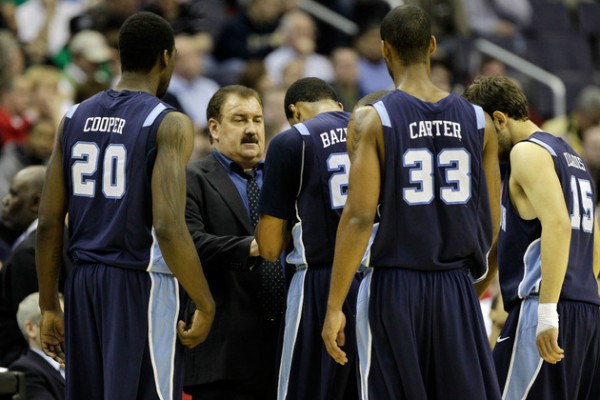CAA Decision Shows Why Conference Realignment is More Complex Than You Think
Posted by EJacoby on June 20th, 2012With a number of schools changing conference affiliation every six months or so, conference realignment remains a dominant factor in the college basketball landscape. Will the Big East soon lose its distinction as the most consistently good hoops league to the ACC? Perhaps so, given that three of the league’s premier teams – West Virginia, Syracuse, and Pittsburgh – will have departed for new conferences after next year, the latter two headed south to the ACC. It begs the question why some schools even consider sticking with their current leagues if they have offers on the table to join a more flourishing conference or – for the mid-majors of the world – the Atlantic 10. But Tuesday’s news that the CAA will disallow departing schools Georgia State and Old Dominion from competing for a conference championship next season sheds some light on the drawbacks of bolting for greener pastures. Not only will these two schools be forced to pay a hefty exit fee of $250,000, but both must wait out a lame duck season in their current leagues without a chance to play for a conference championship. This is especially detrimental to the Monarchs, a team which finished fourth in the CAA last season and should have another good team next year. ODU essentially will waste a year of basketball competition that could significantly affect player focus and development and potentially result in transfers from young players who don’t want to wait two or three seasons for its transition to Conference USA to run smoothly.
As we mentioned earlier in today’s Morning Five, it’s been surprising that other conferences haven’t imposed similar restrictions on departing schools. How crazy would it be if Syracuse and Pittsburgh were unable to compete in the Big East Tournament next season? The CAA has a long-standing rule that migrating schools are not allowed to compete in their postseason tournament, and conference commissioner Tom Yeager says that the universities fully understood the punishments when they decided to bolt. “The conference bylaws were well understood and evaluated when the institutions made their decision to withdraw from the conference,” he said. “We desire to have those institutions that are fully invested in the continued prosperity of the conference represent the conference as its champion.” So now, unless ODU puts together one of the 37 most impressive at-large resumes in hoops next season (highly unlikely), the Monarchs won’t have a realistic shot at the Big Dance despite a flourishing young roster. This puts in perspective how fortunate VCU is to have received immediate acceptance into the Atlantic 10. The Rams won one, and nearly two, games in the NCAA Tournament last season after winning the CAA Tournament (firmly on the bubble at the time). Shaka Smart’s team likely would not have qualified for the Big Dance had it not have played so well to win the league tourney.
The CAA’s ruling gives insight into why changing conferences is such a complicated decision for university administrators. Two weeks ago we highlighted a study that claims conference realignment returns academic benefits for departing schools, providing stronger evidence as to why universities desire to switch leagues in most cases. But looking at Georgia State and Old Dominion, we start to see that the cons add up nearly as quickly as the pros. In the CAA’s case, the league doesn’t look particularly bad from a PR standpoint by upholding its postseason bans, as most observers feel the disappointment of major programs leaving the conference. It’s only surprising that other conferences don’t impose even stronger punishments for departing teams, accepting perhaps some temporary PR backlash for potential long term gain if it can deter other schools from leaving in the future. At this point, anything’s possible with conference realignment – the dark cloud that perpetually hangs over college sports in the modern era.
Evan Jacoby is a regular contributor for RTC. You can find him @evanjacoby on Twitter.











































